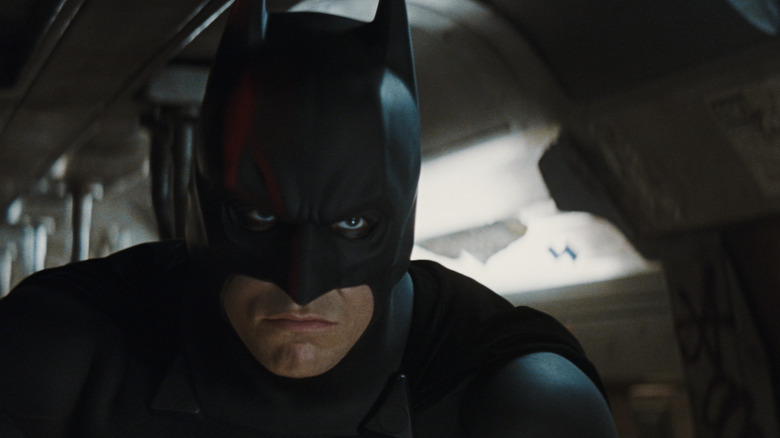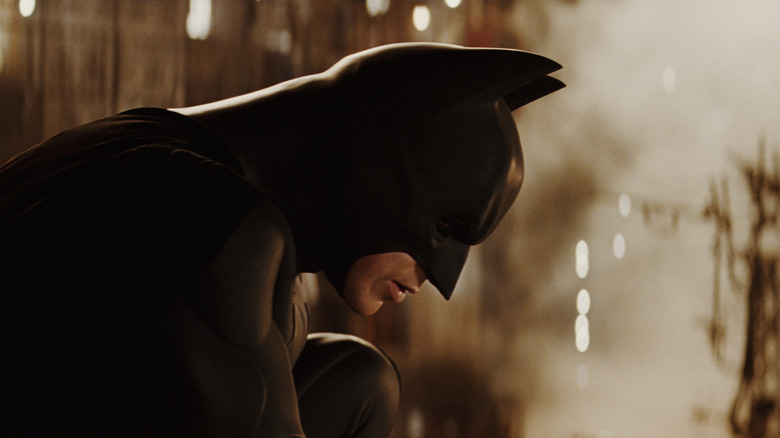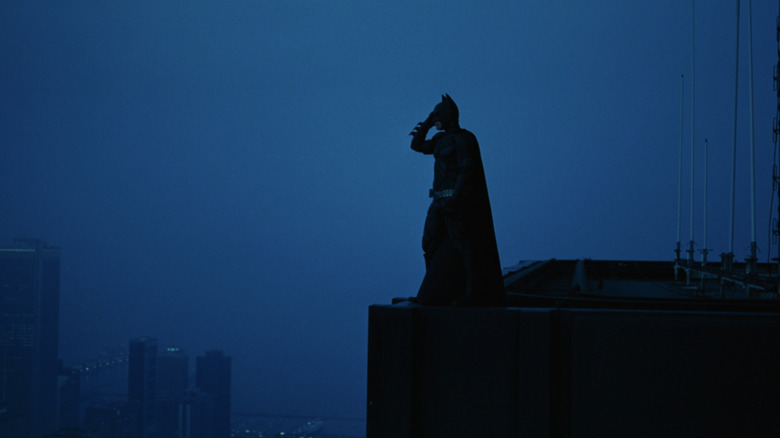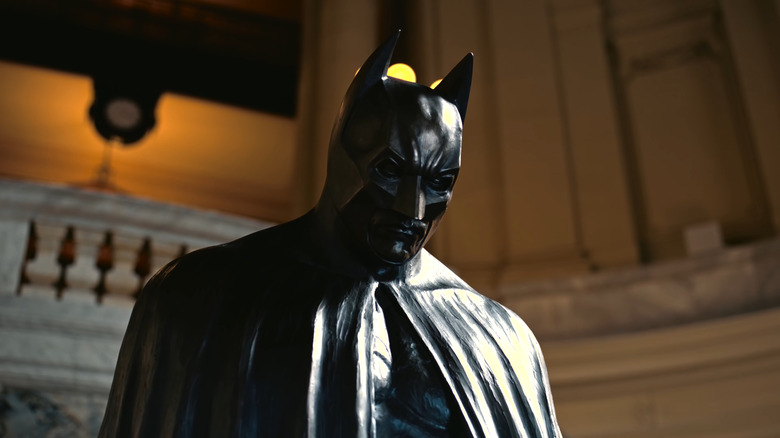Christopher Nolan Never Planned For Batman Begins To Be The First Entry In A Trilogy
When making a movie titled "Batman Begins," it should be safe to assume that there will be another film following the "beginning" of the caped crusader. However, it's important to remember that Nolan's trilogy was made in a different filmmaking landscape. Had a movie like "Batman Begins" been made today, it would be unsurprising to hear of a sequel and maybe even a spin-off before it even released. Cinematic universes are almost a must for blockbusters, but in 2004, for writer and director Christopher Nolan specifically, there was little time to look ahead to the future of Batman.
"The Dark Knight Trilogy," as it's now known, didn't start right off the bat (pun intended) as a trilogy of Bruce Wayne's transformation from man into a symbol. Instead, Christopher Nolan was laser-focused on just making "Batman Begins" a strong origin story for a character as iconic as Batman. The creative team behind "Batman Begins" may have varied viewpoints on whether or not that was always the intention. But for Nolan, it was never about mining character development or strong story points for future installments — it was about creating one good film and seeing where they could take the characters from that point on.
Telling a story that stands tall on its own
In Empire's retrospective piece on "The Dark Knight Trilogy," multiple members of the production team were asked if "Batman Begins" was always supposed to be a launching point for future films. Charles Roven, a producer on all three of Nolan's Batman movies, stated that there weren't any preconceived notions of making more than one:
"Never! It was never conceived as a trilogy. It was always just going to be a single movie. Obviously, we knew there were multiple Batmans before Chris was involved, but we actually consciously forgot about those."
To Jonathan Nolan, an uncredited writer that did some work on "Batman Begins" and a screenwriter for the subsequent two films, there was an understanding that the team shouldn't try to conserve ideas for sequels. All creative effort would need to be geared toward the movie currently being made. Despite that, Jonathan Nolan had (correct) assumptions that his brother had ideas for where else Bruce Wayne's story could go:
"My understanding is that there was no thought towards making a trilogy out of this from the beginning. The only guiding principle was, 'Let's try to make a great movie. If you have good material, put it in this movie. Don't hold on to it. Don't save it.' But I think Chris often has a plan he doesn't share with the rest of us."
'A very naturally developed trilogy'
Now, when you ask Chirsopther Nolan about the long-term plans for his iteration of Batman, the answer is as articulate and well thought out as most of his work. Nolan, in his own words, "had a very clear idea of Bruce's story from fairly early on." However, just because the director had an idea for the character, that doesn't necessarily mean he was already thinking ahead past the film in production at the time.
Nolan would go on to elaborate, comparing his writing process for Batman to how J. R. R. Tolkien wrote his famous trilogy of books:
"'The Lord Of The Rings' is a trilogy, but when the books were being written, [Tolkien] had to write from the beginning to the end. If you're writing a story, you do a plan — I certainly would do a plan for any film — but you do the filling in from the beginning to the end."
The only key difference for Nolan was that when the plans he wrote felt adequate for a feature-length project, he saw it as something ready to be made and released. Any sequels would just be further additions to the same story the director started, albeit with their own proper conclusions so that they could also stand on their own. In that way, "The Dark Knight Trilogy" had a fundamentally different development than most film series that are out today. "I think the difference with movies is once you have a movie's worth of story, it's time to present it to the audience," Nolan said. "So in a sense, the audience is seeing a work in progress over a number of years. It's a very naturally developed trilogy if you like."
Beginnings and endings
"The Dark Knight" trilogy feels like the product of a bygone era. It's only fitting that "The Dark Knight Rises" would conclude the trilogy the same year that Marvel Studios took the world by storm with "The Avengers," a massive blockbuster that sold everyone on the idea of an interconnected universe of films. Christopher Nolan's organic approach to storytelling and focus on one narrative at a time is a clear-cut example of how to keep stories engaging. While some future comic book movies and shows have faltered due to a lack of narrative strength and a need to plant seeds for future stories, there have also been success stories in recent memory.
Marvel Studios projects like "Black Panther" and "Avengers: Endgame" are as well received as they are because of the focus on a single narrative, with world-building taking a backseat. There are definitive conclusions in those two films, while also having a healthy balance of setup for future stories that doesn't impede the one currently being told. Making sure the next superhero movie is more focused on character development rather than teasing a future bad guy is what will help keep these mega franchises afloat.
While it's good to have a "backbone" as a basis for future stories, present movies should matter more than the ones yet to come.



